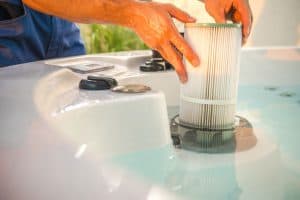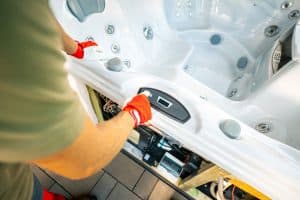When it comes to keeping your spa water safe and sparkling, filters for a hot tub are your first line of defence. Proper maintenance of these vital components ensures your hot tub operates efficiently, prevents unpleasant odours, and extends the life of your spa. If you’re unsure how to care for your hot tub filter, don’t worry — we’ve got you covered with expert, UK-relevant advice that simplifies the process.
Why Filters for a Hot Tub Matter
Hot tub filters trap debris, dirt, oils, and other contaminants. Without regular cleaning or replacement, clogged filters can lead to:
- Poor water circulation
- Cloudy or smelly water
- Increased strain on the pump and heater
By properly maintaining your filters, you ensure your hot tub stays hygienic and enjoyable year-round, providing a consistently relaxing experience for you and your family.
Weekly Cleaning: Your First Defence
To keep your filters for a hot tub in top condition, adopt a simple weekly routine:
- Remove the filter from the tub.
- Rinse with a garden hose to dislodge debris.
- Rotate the filter while rinsing for a thorough clean.
Avoid using high-pressure washers or detergents, which may damage the filter material. Gentle, regular rinsing preserves filter integrity and boosts water clarity.
Monthly Deep Clean
Every 2 weeks, give your filter a deeper clean:
- Soak in Filter Cleaner: Use a specialist filter cleaner suitable for spa filters. Soak the filter in a bucket of the solution overnight.
- Rinse Thoroughly: Ensure no cleaning residue remains before returning it to the tub.
- Dry Completely (Optional): Some owners rotate between two filters — allowing one to dry completely while the other is in use.
This method helps break down oils and lotions that basic rinsing won’t remove. Regular deep cleaning also improves energy efficiency and protects your tub’s internal components.
Explore our full maintenance range to keep your system performing at its best.
When to Replace Your Hot Tub Filter
Even the best-maintained filter won’t last forever. On average, filters for a hot tub should be replaced every 12 months, or:
- When they remain dirty despite cleaning
- If they look damaged, discoloured, or frayed
- If your water remains cloudy or has poor flow despite other maintenance
Replacing filters promptly helps maintain water hygiene and reduces strain on mechanical systems.
Filter Maintenance Mistakes to Avoid
- Using household cleaners: These can leave residues harmful to water chemistry.
- Skipping filter care: Neglecting cleaning can void warranties and lead to bigger repair bills.
- Overusing old filters: Old filters lose their ability to trap contaminants and strain your hot tub system.
Tips for Long-Term Filter Care
- Keep a spare filter: Rotate filters to allow proper drying and reduce wear.
- Track your cleaning schedule: A maintenance log can help avoid missed cleanings.
- Check water balance regularly: Proper pH and sanitiser levels prevent excessive strain on the filter.
Maintaining consistent water chemistry alongside filter care reduces algae growth and keeps your spa healthy and inviting.
Looking after filters for a hot tub doesn’t have to be a chore. With a consistent routine and the right products, you’ll enjoy cleaner water, lower maintenance costs, and a longer-lasting hot tub. For those in the UK, reliable hot tub filter care means year-round spa enjoyment — even in our unpredictable weather.
Need help choosing the right filters or maintenance products?
Browse our maintenance section or speak to our friendly team for expert advice.
Contact us:
📞 0800 999 8707
📧 info@totalhottubs.co.uk
Filters for a Hot Tub
Q1: How often should I clean filters for a hot tub?
A1: Rinse them weekly and deep-clean them every 2 weeks. Replace annually for optimal performance.
Q2: Can I use vinegar to clean my hot tub filter?
A2: Vinegar may help in a pinch but isn’t as effective as commercial filter cleaners designed for hot tub use.
Q3: What happens if I don’t clean my hot tub filter?
A3: Water will become dirty and cloudy, and your pump may overwork, potentially leading to costly repairs.





